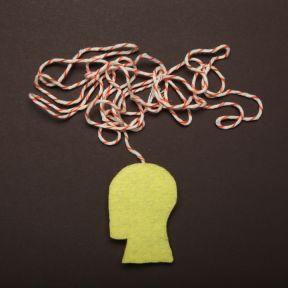STRESS- Is It Time for a Mental Declutter? 3 steps to declutter your brain and boost productivity. Reviewed by Ekua Hagan

KEY POINTS-
- People have more than 6,200 thoughts per day. This mental clutter impacts productivity and health.
- Individuals who regularly multitask with media make more errors and are less productive.
- One of the first steps toward a "mental declutter" is to write down everything on one's mind.
I put my daughter in the bathtub half-dressed one day.
This was a few years back, but she still loves to tell the story and laugh at how bad Mommy’s memory is.
It wasn’t my memory that was the problem though—well not directly, at least.
The problem was, I needed a mental declutter.
I had gotten home from a long day in my 9-5, working on a busy hospital neuroscience team, and I’d been busting my butt to get my side hustle started in my private practice.
Using my weekends and vacation days for my side hustle. Going down to my basement to work after everyone else went to bed to squeeze a few more hours in.
And I had a lot on my mind.
While I got my daughter ready for the bath, I was listening to the story about the craft she made at daycare…making sure we had everything we needed for her bath…and thinking about what I needed to get done after she went to bed including project ideas, emails I needed to reply to, grocery lists I needed to get done….
… I had way too many things on my brain.
Unsurprisingly, I made a mistake and put my daughter in the bath half-dressed.
Our brains are amazing. But they have limits. Especially when it comes to our ability to focus or juggle to-do lists in our minds.
Your brain works best when it’s focusing on one thing at a time.
And you’ve probably noticed this in your daily life.
When you’re totally focused on a project and you really get in the flow and time seems to fly.
Our brains are terrible at multitasking.
Yes, we can walk and chew gum at the same time. But trying to respond to emails while listening to a meeting? Nope. Our brains can’t do both of those things at once.
To be honest, we’re not even very good at walking and talking…
A 2010 study in Applied Cognitive Psychology asked participants to walk while talking on a cell phone or listening to music. Those on cell phones were more likely to slow down or change directions more frequently, and less likely to notice a unicycling clown.
Ever followed someone who’s walking and talking on their cell phone? You’ve probably seen this in action.
Instead of multitasking, what our brains actually do is quickly shift attention back and forth between the two tasks.
So my brain was rapidly shifting focus from my daughter’s story to the bath temperature to my to-do list…
… and as you can guess, that takes a lot of brain power. This makes us more prone to mistakes and drains our batteries fast.
In our busy lives, most of us fall into this productivity trap of trying to mentally multitask.
We think about 400 things at once and feel scattered and overwhelmed.
According to a Queens University study, we have more than 6200 thoughts per day. And all this mental clutter impacts our productivity and our health.
A 2009 Stanford study found that individuals who regularly multitask with media (like responding to several text conversations at once) make more errors when focusing and are less productive.
The solution? A mental declutter.
You know when you open that junk drawer in your kitchen and it’s full to the brim with a bunch of stuff? You can’t find anything you want. Just looking at it feels stressful. So you close it and ignore it until later.
That’s what happens with your brain when you’re thinking about 400 things at once.
Your brain becomes a cluttered junk drawer, which is exhausting and not very efficient.
3 Steps to Declutter Your Brain and Boost Productivity
Here are three steps to declutter your brain so you can focus on your most important task, follow through, and get stuff done without putting your toddler in the bath half-dressed.
Step #1: Get out a pen and paper—Our brains learn best when we write things down, old school pen-and-paper style.
Step #2: Do a brain dump—Write down everything that’s on your mind. Your to-do list. The worries you have about that upcoming presentation. Your kid’s soccer schedule. Whatever it is that’s cluttering your brain and pulling your focus. Write it all down.
Step #3: Keep that pad of paper next to you while you work. Whenever you start to get distracted by other ideas or to-dos, write them down.
Often, writing all this mental clutter down is enough. Your brain recognizes it’s not a thought that needs follow-up. Simply getting it out of your brain and onto paper frees up brain space.
But once you’re done with your current project, if you want you can go back to that list and see if there’s anything on it that requires your action (or if you can just toss it, like the five extra pairs of scissors you’ve accumulated in your junk drawer).
When our brains are clear of the clutter, it gives us the space and focus we need to achieve our goals, without all the stress.
- Questions and Answers
- Opinion
- Story/Motivational/Inspiring
- Technology
- Art
- Causes
- Crafts
- Dance
- Drinks
- Film/Movie
- Fitness
- Food
- Games
- Gardening
- Health
- Home
- Literature
- Music
- Networking
- Other
- Party
- Religion
- Shopping
- Sports
- Theater
- Wellness
- News
- Culture
- War machines and policy

